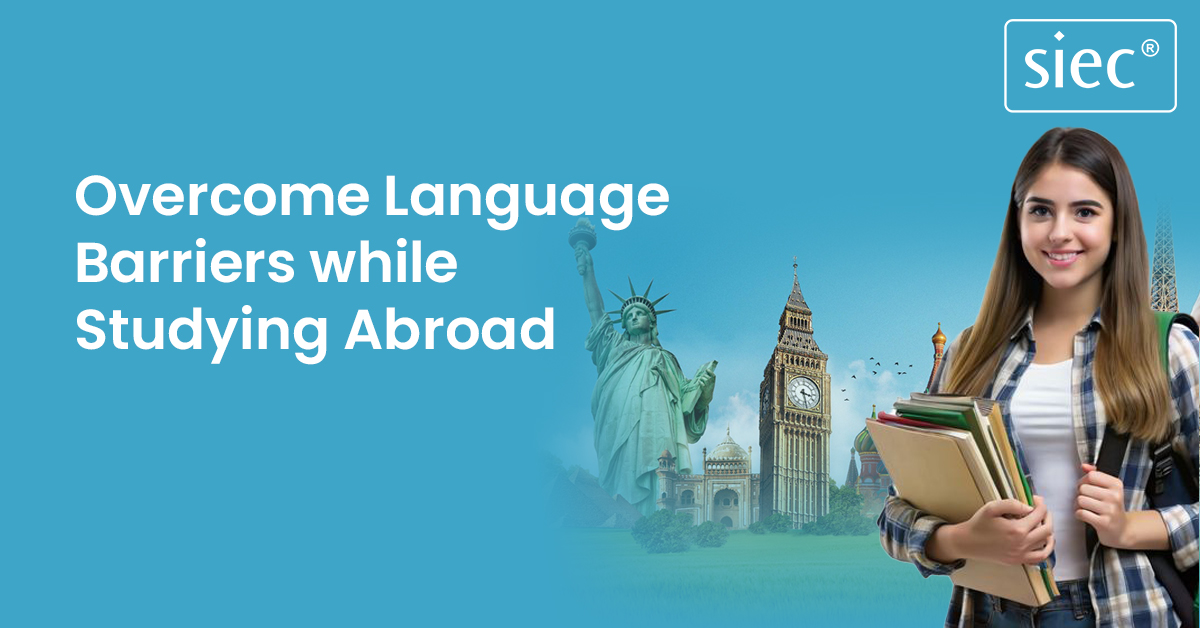
Updated On: 31 October 2025
Overcome Language Barriers while Studying Abroad
Studying Abroad is a lifetime adventure, provides the opportunity to learn a new culture, interact with people from different parts of the world, and even be able to grow both academically and personally. Nevertheless, one of the most prominent factors hindering many students from achieving their study abroad goals is the language barrier. This is especially so when a student is studying in a non-English speaking country, or worse, they are not even confident in their English language skills. But don't lose hope! There are solutions to every problem and that includes overcoming language barriers, which can turn out to be a very positive thing in your quest for the international experience.
Read Also: Benefits of Applying for the January Intake
Strategies to overcome language barriers while studying abroad
Now, let's explore some strategies to overcome language barriers when studying abroad.
- Improve English Proficiency (if required)
In case students are heading for English-speaking countries or institutions, which mainly have English as the language of instruction, it goes without saying that they should possess good English skills to overcome language barriers while studying abroad. Most of these universities tend to have particular requirements on the level of proficiency in the English language, and most of the time, this is achieved through tests such as TOEFL, IELTS or Cambridge English Exams.
- Prepare in Advance: So if you are hoping to go apply to a university abroad please ensure that you fulfil university language requirements before the time of application. Take a good English course or use language apps like Duolingo or Babbel to help you enhance your English level.
- Schedule time to practice speaking: These four skills reading and writing are important but speaking and listening skills are more important due to the fact that life still has to go on. Try to talk to natives, participate in the English speaking club, or watch English movies and listen to English based podcasts to become fluent. Practice speaking to overcome language barriers while studying abroad.
- Learn the Local Language
One of the best strategies to overcome language barriers is to learn the local language. Even if English is the medium of instruction in the choice of your study abroad destination, there are still numerous benefits in learning the local language. For instance, in countries where English is not the native language, learning even basic phrases in the native language establishes a network and facilitates the enjoyment of many experiences sectional to the environment.
- Enroll in language courses: Language courses are provided in most colleges for international students. They do not only inquire the fears on learning the language but offer an opportunity to tub other students with similar fears as to theirs.
- Use language learning apps: Learn new languages in fun and engaging ways with designed apps like Rosetta stone, Hello talk, and Memorise. They help imbed vocabulary, improve pronunciation as well as grammar in a controlled focused time.
- Engage yourself: One of the most effective strategies to acquire a new language is through immersion. Ingrain the use of the native language to talk even in inconsequential scenarios such as ordering food, seeking directions or even random interactions with the natives. Do not be shy about making errors; it is part of the learning process when studying a new language.
- Use Technology to Bridge the Gap
Being a part of this society, one can easily acquire any language and work around any barriers that may prevent people from communicating with one another. Technology should be bring into use to overcome language barrierswhile studying abroad.
- Vacation hiring app: Google Language offers not only rentable vans, but also family vacation assistance. Such an app can come in handy to, for instance, translate signs or responses of waiters or even work during meetings.
- Socializing language tools: websites like Tandem, or Speaky where you can talk to someone who is a native or fluent teacher of your target language that is learning your language. This way both of you can become better at each other's languages Tok%: Vocabulary in the target language Dictionary in learning a language decoding media entertainment.
- Movies and TV series accompanied with subtitles in the language of instruction are the best strategies to enhance the vocabulary and the auditory perceptions. Such activities are very enjoyable and provide an opportunity to learn too!
- Communication Tips in Non-English Speaking Countries
Using gestures is a great way to connect with locals and one of the proven strategies to overcome language barriers while your trip in a foreign land. While the idea of being in a country where one cannot speak English can be very frightening initially, one must acknowledge that there is more to communication than just being able to speak and understand a certain language. There are also certain techniques or approaches that one can apply in order to promote comprehension and surmount the limits set by language.
- Body language and gestures: When words fail, it is possible to express oneself in other ways, through actions like body language or gestures for instance. For example, a smile, a nod, or even pointing to something can do wonders in getting your message across.
- Simplify your language: In case you can speak a bit of the local language, it’s advisable to use short and simple constructions, not to use any colloquialisms, and to speak as slowly as needed. This similarly applies in situations where non-natives are spoken to in English; the individual is encouraged to talk in a less complex manner to prevent miscommunication.
- Carry a phrasebook: Carrying a phrasebook, be it for oral use or not, will be useful whenever you need to make orders, seek assistance, or generally engage locals.
- Be Patient and Stay Positive
Some changes may be uncomfortable, especially when language is a barrier, and one is trying to fit in. However, it is beneficial to be persistent and patient, also one of the best way to overcome language barriers while studying abroad. Suffering from some setbacks is okay; it is normal to make mistakes while learning. Being adaptable helps to ease the process and enhances the enjoyment of the situation.
- Appreciate the little things: Be it successfully holding a conversation in the native language or just grasping the content of a tough lecture, any progress made is progress nonetheless. Appreciate and acknowledge these instances.
- Seek out a support group: Most universities provide assistance to foreign students, such as language classes, learning specialists, and many more. Spend time with other students who are experiencing the same thing; you will be able to assist and teach one another.
See Also: Join SIEC Virtual Office
Overcome language barriers while studying in a foreign country
It might look impossible to overcome language barriers while studying in a foreign country, but as a language learner, such difficulties can as well be the best experiences one can ever got. This includes upgrading your English, learning a foreign language or simply touring a country and knowing what it means to live and talk in that country.
When one goes on exchange, they should not only expect to get an education within the four walls of the classes —people should learn to adapt to new settings and cultures along with communication problems. And enjoy the process because, in the end, every single dialogue, no matter how difficult it is, brings you one step closer to being a citizen of the world.
You may like: Top Study Abroad Experts
Conclusion
Reach out to SIEC for Application inquiries and assistance.
Read more insightful articles:
Staying in India vs. Going Abroad
Scholarships and Financial Aid for International Students



Comments (0)
Leave a Comment